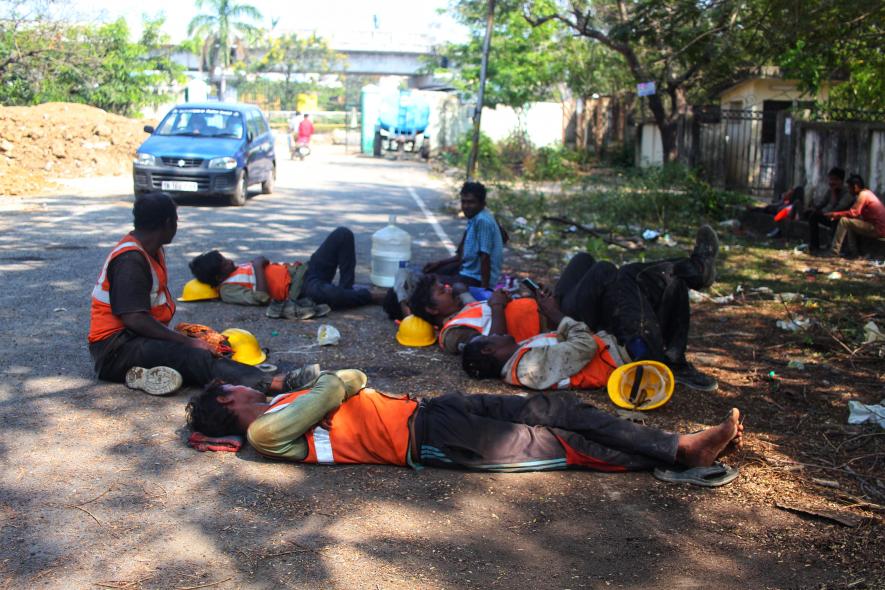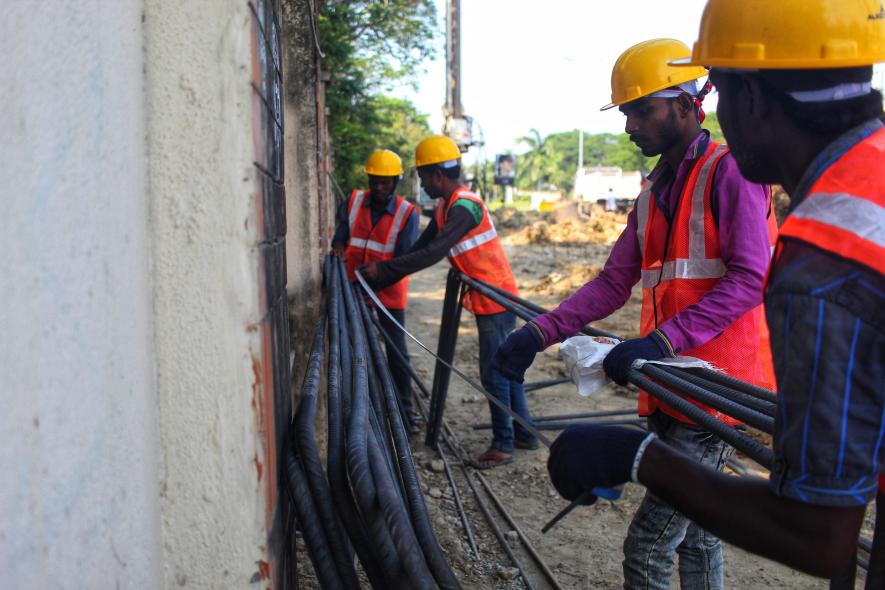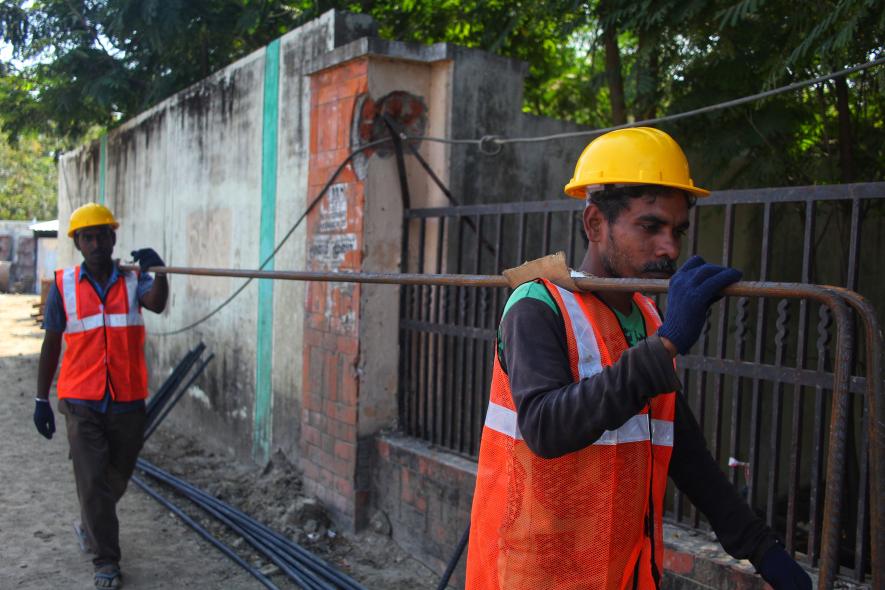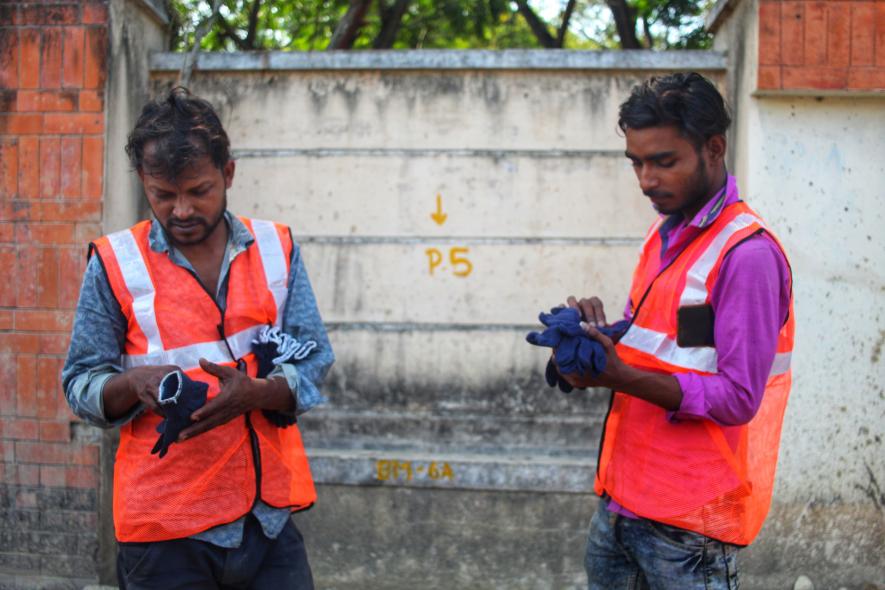Migrant Labourers in TN – Caught Between a Rock and a Hard Place

Image Credit: Arpit Parashar
CHENNAI: Even though Bhola Mehto has just migrated from one part of this country to another, he feels he is in a different world.
“Chennai nahi China aa gaye hai (It’s as if we are in China, not Chennai),” he says.
Mehto hails from Jharkhand’s Hazaribagh district and has been a daily wage labourer for the past 20 years. He’s a high-school graduate and an Industrial Training Institute certificate holder. But, there’s no job for him in Hazaribagh or any other district in his home State.
Before the pandemic struck, Mehto used to drive a tourist motor-boat in Mumbai. But after the lockdown, he left Mumbai even though his boss offered to pay his expenses. He feared he would be thrown out, in case he got the virus.
Now, Mehto earns Rs. 850 a day working as a helper at a construction site in Taramani, whereas his local Tamil Nadu counterparts earn at least Rs.1,200 a day.
More than 1.95 lakh migrant labourers work in Tamil Nadu, according to the 2011 Census report. Over one lakh of them are from Bihar and Jharkhand alone. Mehto is one among them.

Image Credit: Arpit Parashar
Mehto says they are not given employees’ provident fund even though the contractor subtracts money from their wages for the fund. He keeps it all with himself at the end of the month, he adds.
What forces people like Mehto to leave their homes and become migrants? People’s Action for Employment Guarantee, a MGNREGS (rural job guarantee scheme) tracker, reported in October 2020 that nearly 1,854 people in a Bihar village, were “eligible for unemployment allowance amounting to nearly Rs 18 lakh”.
Even though the Ministry of Rural Development claimed that 6.69 crore people gained employment under MGNREGS in June 2020, data indicates that more than 66% of migrants returned to cities after the COVID-19-induced lockdown was lifted in 2020. This suggests that short-term employment programmes might not necessarily be the right solution.
The same data also suggested that most migrants earn less than Rs. 10,000 a month and do not have access to the destination state’s labour schemes.
However, these workers are forced to migrate as states, such as Bihar and Jharkhand, have few employment opportunities. Financial Express reported that only 5.4% of the small and medium-sized enterprises (SMEs) in India are in Bihar.

Image Credit: Arpit Parashar
Another article in the Times of India said: “Bihar has relatively lower productive capacity, which translates into low capital and low returns.” Similar is the case with Jharkhand, Chhattisgarh and Uttar Pradesh.
Out of jobs and a livelihood in their villages, these labourers have no option but to migrate. Birju Rai (40), who hails from Giridih in Jharkhand, says: “There’s just one coal mine back home, how many people can earn by working there? If we stay back, how will we feed our families and send our kids to school?”
Rai says they have no choice. He earns Rs. 800 here, while local labourers earn Rs.1200. Back home, he would have earned only Rs. 300 for this job.
Lepa Singh (42), who used to be a driver till before the lockdown, agrees. Here, he earns Rs. 500 working at a construction site, but he would not even earn Rs. 300 in his village for this job. It is only with his salary and what his wife earns from tailoring, that he is able to make both ends meet.
Another factor that needs to be taken into account is the lack of white collar jobs in their home states. Rajkumar Lal (28), complains that even though he is a commerce graduate, he couldn’t find any job in Bihar. “At least, here I am getting paid Rs. 500 as a helper at this construction site,” he says.
Upendra Kushwaha (39), who hails from Chainwa in Bihar, is a welder who doubles up as a manpower supplier at the construction site. Though he faces a situation similar to Lal, he hasn’t given up all hope yet.
Image Credit: Arpit Parashar
He took up the job and migrated to Chennai because he wanted to send his children to an English-medium school. He also has to spend Rs. 3,500/month on medicines for his father, who is a cardiac patient, and his mother, a diabetes patient-- another crucial reason that forced him to take this job.
Besides financial instability, there is another reason these men are forced to migrate. Ramesh Kumar (42), who hails from Ranchi say he has to hide his identity as a blue-collar worker from his family because they would think it is below his dignity --a post-graduate--to work in a construction site. “Even here I am earning (only) Rs.10,000 per month. But, it’s enough to maintain my dignity in front of my family, which doesn’t know what I do here,” he said.
The COVID-19-induced lockdown has made matters worse. Take Sanjay Singh’s case. The 25-year old, who hails from Jarkunda in Jharkhand, worked as a waiter and driver prior to the pandemic. While he would earn an average of Rs.15,000/month earlier, he doesn’t know how much he’ll get from his present job, because he hasn’t received his wages since the past two months. All he has been given is some allowance for food.
This is the first time Singh is working as a labourer. He left his village for Mumbai as a 16-year old, but is facing this kind of uncertainty for the first time in his life.
How do They Land up in Far Away Cities?
The question arises -- how do these people find jobs in states they’ve never been to, where people speak languages they don’t recognise?

Image Credit : Arpit Parashar
Pankaj Kumar (48) has the answer. He has been a contractor in Dhanbad, Jharkhand, for the past 14 years, and says that most contractors have formed a network with junior engineers working in construction and infrastructure companies. Whenever there is a manpower requirement, the contractors scout for people in their villages looking for work, and send them to the cities.
Satish Kumar (33), the contractor and in-charge of the site in Chennai, confesses that they have stopped hiring local labourers. “They come at 8:30 a.m, leave at 6 p.m and need to be paid at the end of each day,” he said.
But, migrant labourers start working at 6 in the morning till late in the night, also doing overtime and night shifts. They are paid for food every day, and the rest of the wage is paid on a fortnightly or monthly basis.
The labourers say they have not been provided any safety equipment or COVID insurance. They were given boots and safety vests, for which Rs. 250 were deducted from their first salaries. Even if they volunteer to work overtime, they get only Rs. 50 an hour, they said.
“The migrant labourers do not have any political inclinations and do not question at all, which makes working with them a lot easier,” Kumar said.
Sharanya Anand, a human rights activist based in Mumbai, said: “Whatever solutions are churned out seem to be short term and short-sighted. A vision for resolving an issue this grave is key, yet lacking.”
Meanwhile, people like Mehto continue to struggle far, far away from home. “It’s still better working here in humiliating conditions than going back home and facing humiliation there,” he adds.
Get the latest reports & analysis with people's perspective on Protests, movements & deep analytical videos, discussions of the current affairs in your Telegram app. Subscribe to NewsClick's Telegram channel & get Real-Time updates on stories, as they get published on our website.
























